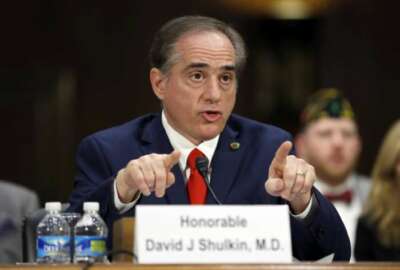
House committee has new accountability legislation for VA employees
An extension and then redesign of the Veterans Choice Program, along with new employee accountability legislation, are top priorities for new Veterans Affairs...
EDITOR’S NOTE: This story updated at Feb. 28 at 5:30 p.m. to reflect more details of the accountability legislation.
Accountability legislation is back on the table for employees at the Veterans Affairs Department.
In fact, it’s the first of VA Secretary David Shulkin’s top 10 priorities for the coming year, which he detailed in a Feb. 28 speech to American Legion members during its annual conference in Washington.
“The House is looking at an accountability bill that I believe they’re going to introduce March 8 and potentially bring to the floor on March 14,” Shulkin told reporters after his speech to the American Legion. “We are working closely with the House and our Senate colleagues to make sure that there is a bill that actually goes through.”
The exact details of the legislation became more clear late Tuesday afternoon, when the House Veterans Affairs Committee released the final text of the VA Accountability First Act of 2017. The bill gives the VA secretary the authority to fire, demote or suspend any employee in the department based on his or her performance or misconduct.
Employees can still appeal their disciplinary action to the Merit Systems Protection Board. Administrative judges have 45 days to make a decision, during which employees may not receive any pay, awards, bonuses, incentives or special benefits.
Accountability has been a major topic for both Congress and the department itself. Lawmakers offered various proposals last year but none of them passed.
“One of the things this accountability bill is going to do is to give Dr. Shulkin, who’s asked for these things, the ability to fire or to hold people accountable for what they do,” House Veterans Affairs Committee Chairman Phil Roe (R-Tenn.) said, who also noted that his committee would mark up the bill next week.
It’s clear both Shulkin and VA committee leadership haven’t forgotten past frustrations in recent years when the MSPB overturned punishments for three Senior Executive Service members. VA stopped using a VA Choice Act authority to fire poor performers in 2016, after the Justice Department questioned its constitutionality.
“When people lose their values and have deviated from the ethics and the values that we all hold dearly, they no longer have the right to work in the VA,” Shulkin said. “We’re going to make sure they don’t work in the VA.”
Shulkin was clear in his intentions as he listed further priorities for the coming year. He’s seen more than 140 assessments from a variety of groups suggesting paths to VA reform.
“We don’t need any more studies or commissions or recommendations on how to fix the VA,” he said. “What we need to do is to begin the work and execute it.”
VA Choice
Shulkin said he’s first working with Congress on legislation that would temporarily extend the Veterans Choice Program, which expires Aug. 7.
Congress passed the Veterans Access, Choice and Accountability Act of 2014 (Choice Act) in reaction to long wait times at VA hospitals across the country.
“We do need the time to make sure that this time, we get the Choice program revision correct,” Shulkin told reporters. “The last time we implemented Choice three years ago we did it in 90 days and we knew that was too short. Unfortunately, we saw a program that didn’t always work the way we wanted it to. We’re looking at some time in the fall to be able to seek legislation for our revised Choice program. We think that’s a reasonable time frame to be able to work closely with Congress.”
Next, Shulkin said he’ll work with Congress to redesign the current Choice Program. The goal is to combine the best of VA care with the best of private sector care in one, seamless experience for veterans — an idea Shulkin himself pitched in the early days of his tenure as VA undersecretary for health.
“Until I can think of a better name, we’re calling it Choice 2.0,” Shulkin said. “This is really meant to make this program work better. It clearly means we’re going to have to eliminate the 40-mile, 30-day rule. As I tell people if I were designing a health care system, I wouldn’t have thought about necessarily picking it based on mileage and wait times. There are better ways to deliver care.”
Senate Armed Services Committee Chairman John McCain (R-Ariz.) has been a proponent of eliminating the 40-mile rule and giving all veterans a VA Choice Card in the past. But ultimately, his views generally align with the path Shulkin proposed.
“The VA does the best job of anybody on PTSD, traumatic brain injury, other prostheses and others,” he said. “But there’s also medical care that veterans need and they need it immediately. They shouldn’t have to wait on a waiting list.”
McCain acknowledged the controversy with the Choice program. Expanding the program points too many resources to the private sector, some critics have argued.
“Community care should be a seamless and efficient process that is easier for veterans and providers to navigate in way too many instances,” Sen. Jon Tester (D-Mont.), the ranking member of the Senate VA Committee, said. “Middlemen, the third party administrators, are getting in the way. It is past time for them to shape up or ship out.”
He added that he wouldn’t support legislation to temporarily extend Choice until VA and Congress developed a redesign of the program.
Other priorities
Shulkin specifically named 10 top priorities for the department this year, which include:
- Employee accountability legislation.
- Temporary extension to the Veterans Choice Program.
- Redesign of the Choice Program.
- Improving VA infrastructure.
- Enhance VA foundational services.
- Better collaboration between VA and the Defense Department.
- Interoperable electronic health records and improvements to VA IT systems.
- Suicide prevention programs.
- Appeals modernization.
- Improving performance at Veterans Benefits Administration.
Modernizing VA infrastructure and facilities will be a particular focus for the department, Shulkin said.
“We’re going to have to make some choices,” he said. “There are some parts of the country where buildings are sitting empty. There’s no sense in keeping buildings empty, so we’re going to consolidate where it makes sense. We’re going to invest in world-class facilities, and we have a commitment to do that.”
The VA Commission on Care included a similar recommendation in its report to Congress. The commission specifically suggested VA begin a BRAC-like assessment of all medical centers and hospitals, citing the 336 vacant buildings and 10.5 million square feet in unused space that are still part of the department’s real estate portfolio.
The department named suicide prevention as VA’s top clinical priority for 2017, a point which McCain and others said they were pleased to hear. An average of 20 veterans a day committed suicide in 2014, according to VA’s latest statistics.
Shulkin said the department planned to launch several new suicide prevention initiatives in the coming weeks.
Copyright © 2025 Federal News Network. All rights reserved. This website is not intended for users located within the European Economic Area.
Nicole Ogrysko is a reporter for Federal News Network focusing on the federal workforce and federal pay and benefits.
Follow @nogryskoWFED





